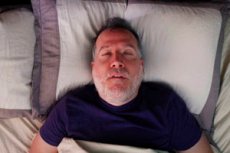
加州大学欧文分校领导的研究小组发现,快速眼动(REM)睡眠呼吸暂停事件的频率与阿尔茨海默病高危老年人的言语记忆受损程度之间存在联系。言语记忆是指存储和回忆以口头或书面文字形式呈现的信息的认知能力,尤其容易受到阿尔茨海默病的影响。
《阿尔茨海默病研究与治疗》杂志最近发表的一项研究发现,睡眠呼吸暂停(睡眠期间呼吸中断)的严重程度与认知能力下降之间存在特定的相关性。与非快速眼动睡眠相比,快速眼动睡眠期间的评分较高与记忆力较差有关。
“我们的研究结果强调了睡眠呼吸暂停与记忆相关的特定特征,这一点很重要,因为在临床上,快速眼动睡眠期间发生的事件经常被忽视或最小化,”该研究的共同作者、加州大学欧文分校精神病学和人类行为学助理教授布莱斯·曼德说。
大部分睡眠时间都处于非快速眼动睡眠阶段,因此总体平均呼吸暂停严重程度评分可能远低于快速眼动睡眠期间的评分。这意味着,高危人群可能会被误诊和低估,因为目前的评估标准并不关注睡眠阶段的呼吸暂停严重程度。
“此外,”研究报告的共同作者、维克森林大学医学院精神病学和行为医学系教授兼主任露丝·本卡 (Ruth Benka) 表示,“我们发现女性患快速眼动睡眠呼吸暂停的比例高于男性,这可能会增加她们患阿尔茨海默病的风险。”

散点图显示了快速眼动睡眠期间(A)呼吸暂停低通气指数 (AHI)、(B) 呼吸紊乱指数 (RDI) 和 (C) 氧减饱和指数 (ODI) 与总体 RAVLT 学习分数之间的关系,校正了年龄、性别、评估间隔时间、受教育年限、体重指数 (BMI) 和 APOE4 状态。来源:阿尔茨海默病研究与治疗 (2024)。DOI:10.1186/s13195-024-01446-3
这项研究涉及威斯康星州阿尔茨海默病研究中心的81名具有较高风险因素的中老年人,其中62%为女性。参与者接受了多导睡眠图(一项记录睡眠期间脑电波、眼球运动、肌肉活动、血氧水平、心率和呼吸的综合测试)和言语记忆评估。结果表明,快速眼动呼吸暂停事件是言语记忆衰退的一个关键因素,尤其是在具有阿尔茨海默病遗传易感性和有家族病史的人群中。
“我们的研究结果凸显了睡眠呼吸暂停、记忆功能和阿尔茨海默病风险之间的复杂关系,”Mander 说道。“识别和处理 REM 特异性事件,对于制定针对个人睡眠模式的主动、个性化评估和治疗方法至关重要。”

